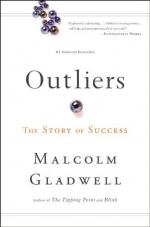
|
| Name: _________________________ | Period: ___________________ |
This test consists of 15 multiple choice questions and 5 short answer questions.
Multiple Choice Questions
1. How do the experimenters know if the men's hormone levels rise?
(a) Saliva sample.
(b) Sweat breaking out on the face.
(c) Red in face.
(d) Blood work.
2. What does Korean airlines determine about their flight crew members?
(a) They are inattentive and undertrained.
(b) They are unhappy.
(c) They are some of the best trained in the airline industry.
(d) They are average for the airline industry.
3. What cultural legacy among Asian peoples does Gladwell discuss?
(a) Samurai.
(b) Calligraphy.
(c) Rice paddies.
(d) Honor.
4. Who are the Howards and Turners?
(a) Two large families who settle in Harlan.
(b) Two families who go into the garment business in Harlan.
(c) Two families who continuously intermarry.
(d) Two families who go into the mining business in Harlan.
5. What is one way in which Flom's life is affected by the second lesson of Joe Flom?
(a) He is born in a time when there is a high birth rate in the United States.
(b) He is born in a time when law is not a popular field in the United States.
(c) He is born in a time when the laws are favorable for Jewish people in the United States.
(d) He is born in a time when there is a low birth rate in the United States.
6. What does George Hofstede research?
(a) Cultural differences within a country.
(b) Plane crashes.
(c) Cultural differences among countries.
(d) Training routines.
7. What did the early American educational theorists claim about long hours of school?
(a) It endgenders a strong working ethic.
(b) It engenders strong morals.
(c) It keeps young people out of trouble.
(d) It results in over stimulating the mind.
8. What do the ask some college-aged men to do?
(a) Sit in a room alone for 24 hours.
(b) Fast for 24 hours.
(c) Refrain from talking to any woman for 72 hours.
(d) Fill out a questionaire.
9. What does the ground have to be like for a successful rice paddy?
(a) Well drained.
(b) Sandy.
(c) Level.
(d) Loamy.
10. How often does the rice farmer have to tend to the rice paddies?
(a) Two or three times a month.
(b) Just in the Spring.
(c) Just in the summer.
(d) Continually.
11. What do the men have to do after performing the task asked of them?
(a) Walk down a hall to hand it in.
(b) Write up their impressions of the experience.
(c) Undergo a battery of psychological tests.
(d) Share their experience with an audience.
12. What did early American educational theorists claim about education?
(a) Not everyone who is educated is wise.
(b) Education is not for those who prefer the school of hard knocks.
(c) Too much education is not good for average people.
(d) Anyone can attain a high level of excellence if s/he works hard enough.
13. What is the Colombian pilot's attitude when he communicates the plane's situation to the air traffic controller?
(a) Casual.
(b) He does not mention their fuel situation at all.
(c) Intense.
(d) Angry.
14. From what region of the country are the angriest subjects?
(a) North.
(b) South.
(c) They are all equally angry.
(d) Midwest.
15. When is Harlan settled?
(a) 1919.
(b) 1819.
(c) 1840.
(d) 1890.
Short Answer Questions
1. What do the pilots instruments indicate?
2. What do some countries consider doing with Korean Airlines?
3. What is Suren Ratwatte's area of expertise?
4. What do the pilot and co-pilot of a Colombian airplane that crashes fail to effectively communicate?
5. What does Gladwell think is the reason for the success of the KIPP Academy?
|
This section contains 655 words (approx. 3 pages at 300 words per page) |

|




